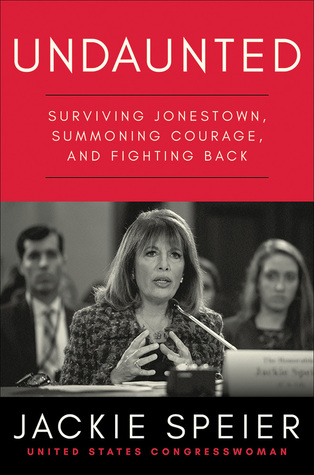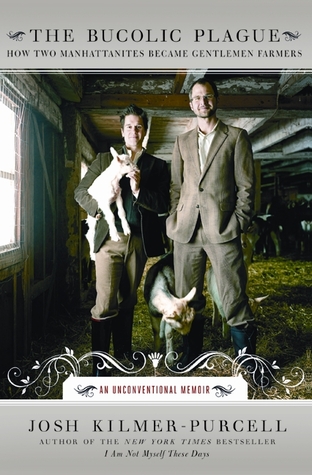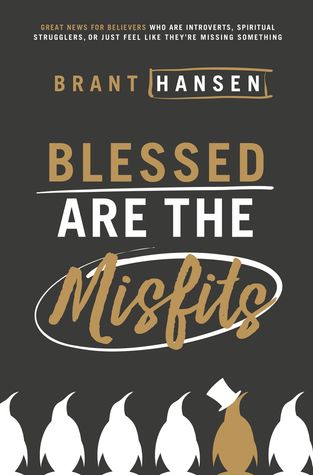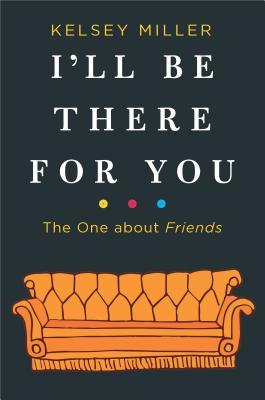
Undaunted: surviving Jonestown, summoning courage, and fighting back by Jackie Speier
Some quotes I liked:
"After race riots roiled through much of the largely African American neighborhood of Watts, Los Angeles, Ryan briefly took a job as a substitute teacher in one of the poorest schools in the community. He wanted to have real conversations with the students, parents, and educators. What he learned from that experience found its way into legislation the following season. Then in 1970, as chairman of a committee overseeing prison reform, he had listened to inmates talk about the subhuman conditions in California prisons. So, under a pseudonym, he had himself booked, strip-searched, and incarcerated for ten days at Folsom State Prison to get an unvarnished perspective of the criminal justice system in California. He only revealed his identity when it was time to be released. A couple of the prisoners appreciated his efforts. He treated them as equals, and ideally he would help pass legislation to improve their living conditions (which he later did)." (p. 36)
"The congressman wanted answers [about Jonestown]. No argument or threat would have been able to deter him...Politically, there was nothing to gain - and everything to lose - by taking on Jim Jones, who was reportedly a live wire of the most dangerous variety. There was no telling what he'd do if confronted and challenged. Still, none of those red flags made the congressman pause or reconsider. Ryan didn't care about doing what was popular, and he didn't pay much mind to doing what others deemed safe. He cared about doing what he thought was right. Never one to accept thirdhand information or be dissuaded by hearsay, he confirmed that he was going to embark on a fact-finding - and potentially lifesaving - trip after the November election, to check on the constituents who had followed Jones into the Guyanese jungle." (p. 49)
"A campaign consultant once advised me, with the best of intentions, to not be so focused on women, that doing so would only alienate men. But I responded, and still believe, 'If women don't do it, who will?' If a woman avoids taking on the cause of women, who do we expect to affect change? Should we leave it to men to fight for our equal pay?" (p. 170)

The Last Ballad by Wiley Cash (Books & Banter and Evening Edition)
In 1929 Ella May Wiggins works 12-hour days, six days a week in a dirty, dangerous job in a textile mill in Gastonia, NC making $9 a week. She has 4 children and one on the way and her husband, who never liked to work much to begin with, has walked away leaving her to try to find a way to support everyone by herself. When she sees a union flyer she decides to check it out mainly out of desperation for something better for her family. Her decision to go to that first union rally will quickly shape the rest of Ella May's life. Told from several character's perspectives, The Last Balladtells Ella May's story - which is based on true events, as well as the plight of poor working class people (both white and black) in a time before many workplace protection laws were in place. Cash does a great job with all the characters and telling the story from their perspective and while at first you're not sure why all of the characters are introduced everything comes together in the end to give a very well-rounded story.
Some quotes I liked:
"Ella wasn't pretty, not like that girl. Pretty took the will to be so and the money to do it and the time to see to it and the sleep to maintain it, and Ella didn't have any of those things." (p. 6)
"...it was this past and present of find industrialization that Richard wanted the Lytles to understand marked him and his family as being one of its most wealthy and famous. While the Lytles' ancestors had sipped juleps on the veranda and overseen the work of enslaved black bodies in brackish water, Richard's father and grandfather had moved mountains, electrified production, cared for the poor, and changed the state forever." (p. 190)
Some quotes I liked:
"Ella wasn't pretty, not like that girl. Pretty took the will to be so and the money to do it and the time to see to it and the sleep to maintain it, and Ella didn't have any of those things." (p. 6)
"...it was this past and present of find industrialization that Richard wanted the Lytles to understand marked him and his family as being one of its most wealthy and famous. While the Lytles' ancestors had sipped juleps on the veranda and overseen the work of enslaved black bodies in brackish water, Richard's father and grandfather had moved mountains, electrified production, cared for the poor, and changed the state forever." (p. 190)

The Bucolic Plague by Josh Kilmer-Purcell
Some quotes I liked:
"Ever since Martha mentioned that she'd like to visit the farm, Brent had been seeing everything through her eyes. And when one peers through Martha glasses, the world isn't rose colored. It's a great big collection of disappointing imperfections." (p. 169)
"I'd come to realize that while most Americans don't have any idea what actually happens on a farm, they all think they do. Having spent hours as children with their Fisher-Price farms and pull-string toys that make animal noises, people have created a tableau of farm life in their heads that couldn't be further from reality. They envision Brent and me spending our weekends driving a big red tractor aimlessly around the barnyard, taking breaks to milk things and perhaps tote a bale of hay somewhere. Fisher-Price seems to ensure that every little kid grows up with a false perception of the lives of firemen, policemen, and farmers. Maybe if they made more accounting office play sets and little middle management figures, they'd hit the mark better - or at least be more demographically accurate." (p. 212-13)
[When Brent is laid off from the Martha Stewart TV show after spending Labor Day weekend traveling with her for the show] "'You mean you just spent two days with her, flying on the jet and eating meals together, and she never mentioned that you were going to be let go the minute you got back to New York?' 'Martha doesn't really handle layoffs.' [Brent responded] I find myself growing enraged...She never once e-mailed or called Brent after his layoff. In all my years as an employee, and later as a manager and partner, I have never let a terminated colleague disappear without privately acknowledging her or his contributions, and offering to help in any way that I could. For a woman who has publicly lamented her lack of friends, it's hard to believe that her sixty-nine years of human interaction haven't illuminated the cause." (p. 231 & 236)

Blessed are the Misfits by Brant Hansen
Brant Hansen has Asperger syndrome, is an introvert, and has rarely "felt" God's presence in his life, but is still a Believer and in this book he sets out to show us that misfits like him are not second-class Christians. If you've struggled to fit in with the Christian culture then this is the book for you. There is a place for everyone in the Church, but often if you're not an extrovert who loves talking to strangers or getting up on stage and singing in front of huge congregations you can feel left out or less than. Hansen gives countless examples of how Jesus not only accepted outcasts and misfits, but actively sought them out and made them part of his inner circle. Hansen also gives ways that spiritual misfits CAN get involved in their local church and community in ways that work with their personality, not against it. While nothing in this book was a huge surprise for me, I think it's a good reminder for Christians that there are all kinds of people and God calls us to love everyone - not just the people who are just like us.
Some quotes I liked:
"Jesus is exactly what I would hope God would be: a blunt-speaking, underdog-loving, field-leveling, jaw-droppingly brilliant, authority-challenging, short-story-telling, self-sacrificing, bring-the-children-to-Me...healer. And if there's a God, and this is what God is like...this is incredibly good news." (p. 26)
"But that's just it: we have to struggle. It's striking how often people think that a longstanding, ongoing struggle against a particular temptation means they are somehow failing. No. You're not failing. The struggle means God is still working in you. Do not stop struggling. We should expect struggle as part of the Christian life." (p. 129)
Some quotes I liked:
"Jesus is exactly what I would hope God would be: a blunt-speaking, underdog-loving, field-leveling, jaw-droppingly brilliant, authority-challenging, short-story-telling, self-sacrificing, bring-the-children-to-Me...healer. And if there's a God, and this is what God is like...this is incredibly good news." (p. 26)
"But that's just it: we have to struggle. It's striking how often people think that a longstanding, ongoing struggle against a particular temptation means they are somehow failing. No. You're not failing. The struggle means God is still working in you. Do not stop struggling. We should expect struggle as part of the Christian life." (p. 129)

I'll Be There For You: the one about Friends by Kelsey Miller
I have fond memories of watching the TV show Friends with my best friend in high school on my tiny TV in my bedroom. So, when I saw this book and realized that Kelsey Miller was the author I knew it would be good. Miller explores the phenomenon of Friends - how the idea was born, how the cast was selected, and how it blew up and shaped our culture. The background of the show was really interesting and how the cast truly became friends in real life. It was also interesting to read about how the cast really banded together and used that to negotiate fair and equal salaries - something that was unheard of at the time. Today Friends is nostalgia for a lot of people "comfort food TV" as it was described in the book. While I loved Friends when it was first on the air and rooted for Ross and Rachel to get together, after awhile I just lost interest in the show and I think it went on longer than it should have just because of how much money it was making. People rip on Jerry Seinfeld for turning down $110 million for a tenth season of Seinfeld, but it is better to "go out on a high note" as he did and not let the show drag on until it's just dumb. Unfortunately I think that's what happened with Friends, but it's still wildly popular more than 15 years off the air and this book explains why that is. Overall, even though I'm not a die-hard Friends fan anymore this was still a nice trip down memory lane.
Some quotes I liked:
"That's what struck Wild during the shoot. 'It was much more like being with a band than being with a TV cast,' he said. However, 'I've never seen a cast, and very rarely seen a band, stick together to the degree they did.' Wild had been a music writer for years before covering television, and noticed that, yes, the Friends did appear to genuinely like one another - but more importantly, they seemed to recognize how much they needed each other. They had to function as a group or else things could go sour fast. They spent meals together, watched the show together on Thursday nights, and did all the promotional photos as a group." (p. 91)
"No television ensemble had ever negotiated as a group, nor had any cast ever had such power at the bargaining table. If they were serious about this all-for-one-one-for-all approach, then they could walk away and take the entire show with them. Headlines lit up with reports of the Friendscast banding together to make these startling demands, and threatening to strike if they weren't met. It wasn't just trade publications, either, but mainstream outlets from Us Weeklyto the Washington Post. Historically, the general public wouldn't have even known, let alone cared, about the details of television contract negotiations. But this one had become both tabloid gossip and national news." (p. 126)
"Some say [Friends] jumped the shark when Ross said 'Rachel' at the alter, instead of 'Emily,' Others cite the Vegas episode, when the two of them got drunk and married. But those were fairly standard plot twists in the soap opera of Ross and Rachel. The truth is, when compared to other shows, Friends never really jumped the shark - but it came pretty close. It put on water skis and got in the ocean. It had nothing to do with Rachel and Ross, though. The Friendsshark was Rachel and Joey." (p. 190-91)
Some quotes I liked:
"That's what struck Wild during the shoot. 'It was much more like being with a band than being with a TV cast,' he said. However, 'I've never seen a cast, and very rarely seen a band, stick together to the degree they did.' Wild had been a music writer for years before covering television, and noticed that, yes, the Friends did appear to genuinely like one another - but more importantly, they seemed to recognize how much they needed each other. They had to function as a group or else things could go sour fast. They spent meals together, watched the show together on Thursday nights, and did all the promotional photos as a group." (p. 91)
"No television ensemble had ever negotiated as a group, nor had any cast ever had such power at the bargaining table. If they were serious about this all-for-one-one-for-all approach, then they could walk away and take the entire show with them. Headlines lit up with reports of the Friendscast banding together to make these startling demands, and threatening to strike if they weren't met. It wasn't just trade publications, either, but mainstream outlets from Us Weeklyto the Washington Post. Historically, the general public wouldn't have even known, let alone cared, about the details of television contract negotiations. But this one had become both tabloid gossip and national news." (p. 126)
"Some say [Friends] jumped the shark when Ross said 'Rachel' at the alter, instead of 'Emily,' Others cite the Vegas episode, when the two of them got drunk and married. But those were fairly standard plot twists in the soap opera of Ross and Rachel. The truth is, when compared to other shows, Friends never really jumped the shark - but it came pretty close. It put on water skis and got in the ocean. It had nothing to do with Rachel and Ross, though. The Friendsshark was Rachel and Joey." (p. 190-91)

Roar: thirty stories one roar by Cecelia Ahern

Outer Order Inner Calm: declutter and organize to make more room for happiness by Gretchen Rubin
I really like Gretchen Rubin and while this book is very different from her other books she still uses some of the principles from her other books to inform this one. She found through her research about happiness that often outer order helps create inner calm - hence the title of this book. What I really like is that unlike many other organizing books this one is not focusing on minimalism. Rubin understands that organization is not the same for everyone. I also really liked that she focused on having your home reflect who you are, so cleaning and organizing so that the things that are important to you are what you see every day. This book is a really quick read and each section is full of quick 1-2 page tips about creating outer order for inner calm. The five areas Rubin covers are 1) Make Choices, 2) Create Order, 3) Know Yourself - and Others, 4) Cultivate Helpful Habits, and 5) Add Beauty. This is a book I could see myself referring back to, so it might be one I buy. If you're wanting to clear clutter and be more organized, but you're NOT a minimalist - this is a great book for you.
No comments:
Post a Comment